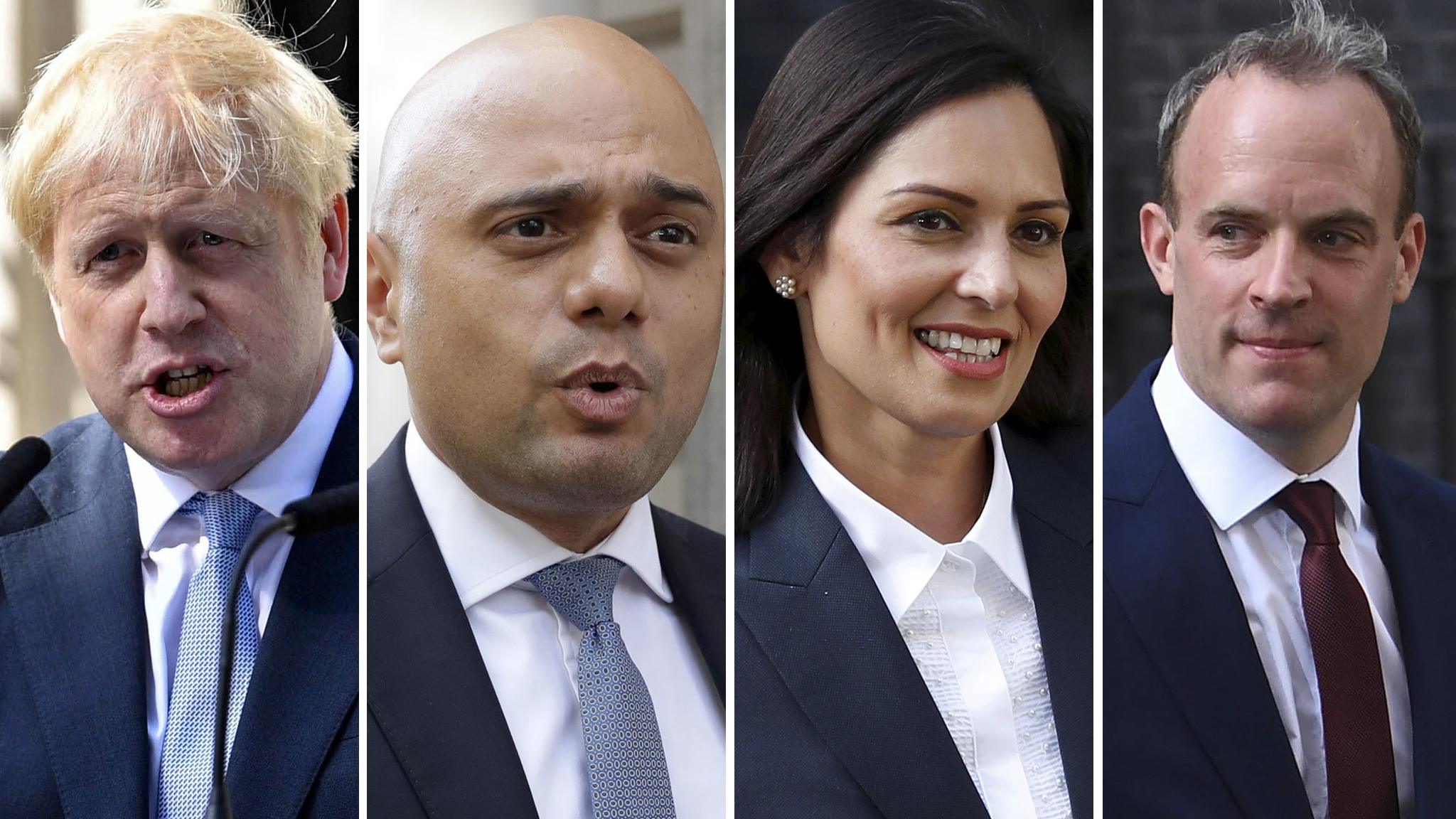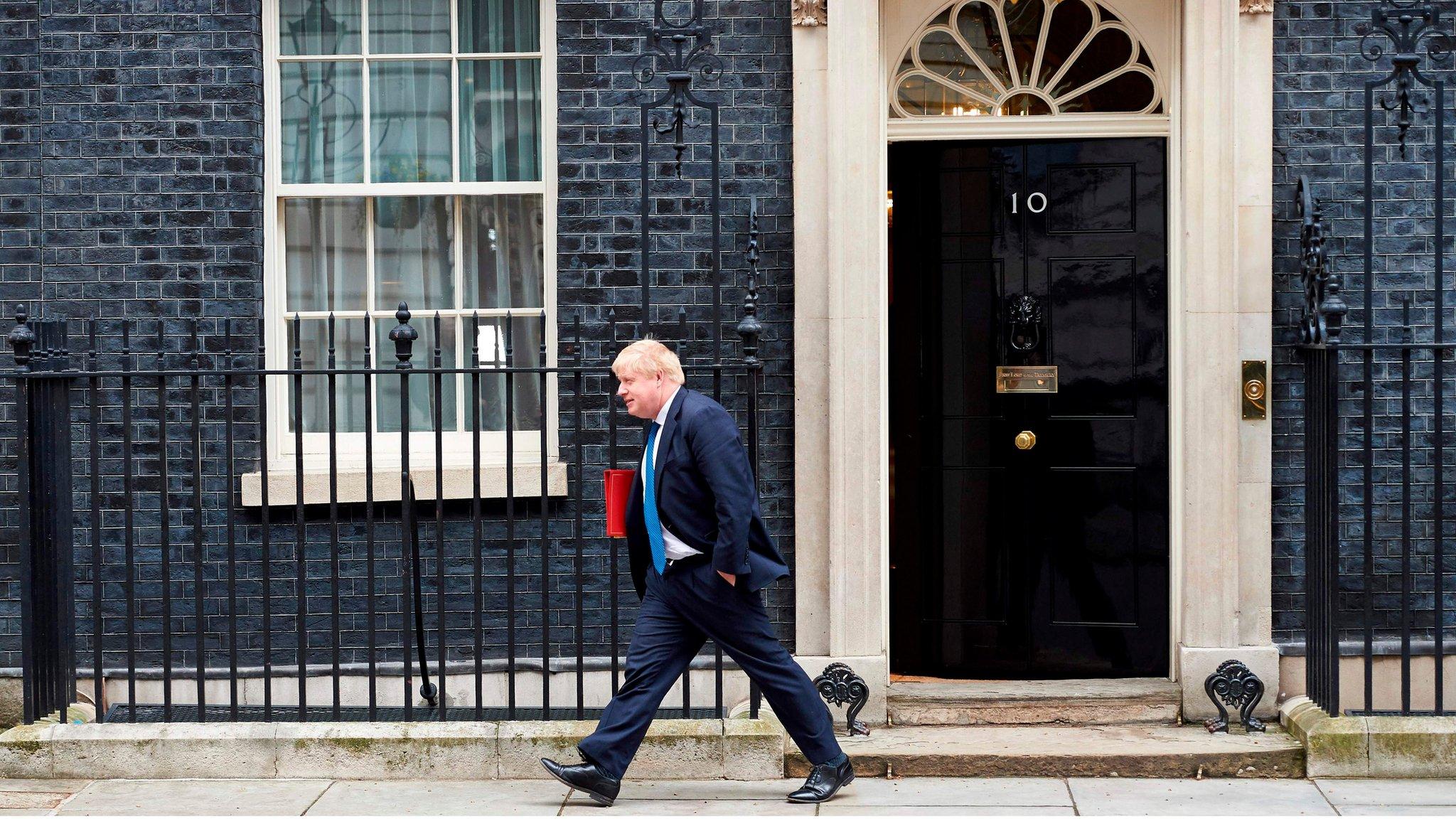Boris Johnson: Beyond Brexit, what's in the new PM's in-tray?
- Published
- comments
As in-trays go, it's a full one
Brexit is THE priority of Boris Johnson's government.
The new prime minister has just 99 days until the UK leaves the EU, and he faces an uphill task to secure a new deal.
But it's not the only demand on Mr Johnson's time. One criticism of Theresa May's time in Number 10 is that other important decisions that affected the future of the UK were put on hold because Brexit became all-consuming.
But these nagging priorities have not gone away. So what are they?

After years of the government rejecting complaints about funding shortages for England's schools, Boris Johnson is now promising to spend more. Like a constant stone in the shoe, worries about school budgets have hobbled the May government's efforts in education - and the incoming prime minister will be told this needs to be tackled as a priority.
But how much will he offer? And will it be enough to satisfy head teachers who have been radicalised into unlikely activists over cash shortages?
Mr Johnson's promise to increase per-pupil funding to at least £5,000 per year would mean an extra £50m - and in terms of the overall budget would be, to use one of his own phrases, only "chickenfeed". Other campaign comments suggested reversing the decline in budgets - which would mean closer to £5bn.
So schools will be waiting to see how much bristle is on the new broom.
Investing in education is a key part of Mr Johnson's post-Brexit pitch - and universities will be seen as important to research, boosting infrastructure and creating an economy of bright ideas. They will also be seen as an important international export opportunity and source of soft power - and all the signs are that a Johnson administration will see overseas students as a financial asset rather than an immigration problem.
The other big thorny question in the education in-tray will be whether to cut tuition fees to £7,500, as announced by a review requested by Theresa May. Universities will campaign against it, but with the prospect of an election never far away, could he really announce a U-turn on lowering fees, taking thousands off student debt?

The challenge facing Mr Johnson in terms of both health and care in England - responsibility for both is devolved - can be summed up in one word: money.
The NHS has been promised (relatively-speaking) lots of it - an extra £20bn a year by 2023. But it is how it is spent that matters. Social care - the system administered by councils to support the elderly and disabled - is in desperate need of more. But it is unclear where it will come from.
Unlike Jeremy Hunt, who drew on his experience as health secretary, Boris Johnson had relatively little to say about the NHS during the leadership campaign. Perhaps his most revealing remarks came at a private garden party for Conservative party members. He talked about the NHS being the "crowning glory" of the country, but that in return for the cash injection, reform and greater productivity were needed.
Many in the health service will scoff at this - a 2012 restructure is still fresh in the memory, and the NHS is already considered one of the most efficient health systems in the world.
Finding a solution to the social care crisis is, after Brexit, perhaps the most difficult conundrum. Tales of frail and vulnerable people going without support are appearing more regularly.
But the Tories - and Labour before them - have talked endlessly about what to do without actually doing it. Mr Johnson is, it is understood, sympathetic to the idea of over 40s paying what is effectively an extra tax to fund care for their old age.

For the past 20 years, the Home Office has struggled to come up with a modern migration system that satisfies everyone. A failure to reach a national consensus over migration was a driving factor behind many votes to leave the EU.
Yet Boris Johnson could not be more different to Theresa May on immigration. As mayor of London, he witnessed first-hand the role migration played in boosting the capital's growth. He is so liberal on the issue that he has repeatedly floated an amnesty for migrants who arrived in the UK illegally, external.
His instincts therefore chime with those of Sajid Javid who, as home secretary, disowned the phrase "hostile environment" and effectively abandoned his party's never-achieved net migration target.
But the challenge remains massive. The Home Office is still dealing with the disaster of Windrush generation deportations - while seeking to win the trust of EU citizens worried about their future in a country they have made home.
On top of that, it needs to devise a post-Brexit immigration system that many experts warn it is neither ready nor able to deliver.
Draft plans published last year propose both scrapping a cap on skilled workers and no restriction on unskilled workers coming for up to a year. But what happens if the UK crashes out of the EU with no deal? Many experts predict Brussels will demand preferential access to the UK for its citizens in return for a trade deal.

As Mr Johnson steps into Number 10, the cloud of uncertainty hovering over High Speed 2 (HS2) gets a little thicker. During the leadership campaign he said he wouldn't scrap plans for the new rail line linking London, Birmingham, Manchester and Leeds. But he did express "anxieties about the business case".
Then, last weekend, came reports the project's £56bn budget could balloon to as much as £85bn. Boris Johnson has already asked a former Chairman of HS2, to look at the scheme.
Significant alterations would not be straightforward. However, it feels like the new prime minister will want to make his mark.
Another project known as Northern Powerhouse Rail, which would see new and better rail lines linking cities in the north of England, got a clearer backing from Mr Johnson.
And then there is Heathrow.
Boris Johnson once promised to lie-down in front of the bulldozers to stop a third runway being built at the airport. However his opposition has become muted. Mr Johnson, I'm told, will not try to scupper the scheme.
Perhaps more immediate than big infrastructure projects is the transport everyday: how to sort the UK's charging infrastructure so more people buy electric cars; what reforms are needed to improve the railways. A government-commissioned review will report this autumn.
Not surprisingly, the answer to many of these pressing demands is more money...

Mr Johnson has his hands on three big policy levers almost immediately that could, in combination, reshape the economy.
Firstly, our trading stance should change materially as a result of his Brexit approach. It detaches our total integration with the European economy, and appears to involve a closer relationship economically with the United States. If by 31 October he carries through his promise to leave, even without a deal, that change could be rather abrupt.
Second, the approach on the public finances is about to change too. Tax, spending and borrowing plans - known as fiscal policy - will change. One former cabinet minister wooed by the Johnson team said the strategy was "spend, spend, spend".
The tax cuts and spending pledges sprayed around the Conservative leadership campaign amounted to more than £30bn a year. In essence this dispenses with the idea of running a surplus.
As spending will be higher, and taxes cut, planned deficits will rise. There is room for this, and interest rates paid on our national debts are still at historic lows.
The risk of course is that a no-deal Brexit in combination with higher borrowing could cause problems.
The Treasury will prepare a stimulus plan to help rescue impacted manufacturers and farmers, and perhaps consumers too. But this brings us on to the third lever - the Bank of England.
Although traditionally independent on setting interest rates, or monetary policy, it is Mr Johnson's good fortune that his government will advise the Queen on the appointment of the bank's next governor, to replace Mark Carney.
Some economists rather close to the new PM are in the mix. Inflation is on target. Rates could be cut further, and money created to flood the economy in the event of no deal. The bank could, as it has done repeatedly since the crisis, buy up the increased flow of government borrowing.
There are other risks here. Mr Johnson's party has long decried the Opposition for its belief in a "magic money tree" - with the hurdles ahead he may well need to find his own smaller version - a magic money shrub.
- Published22 July 2019

- Published23 July 2019
